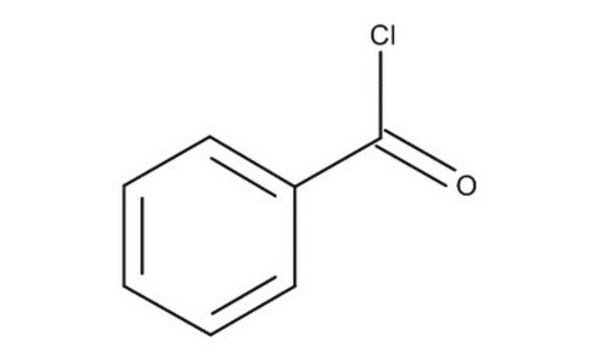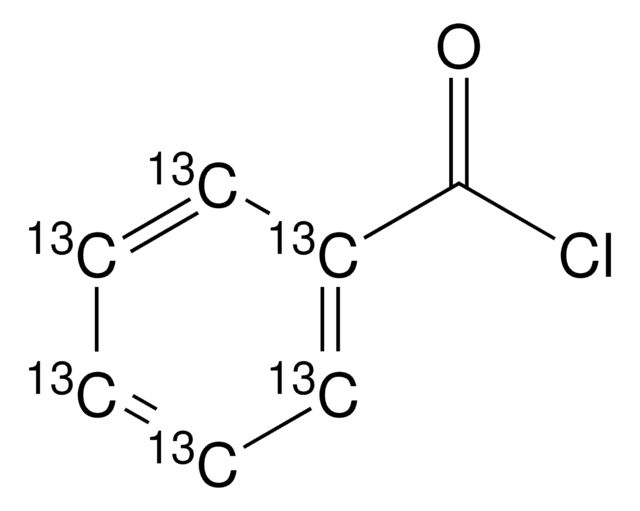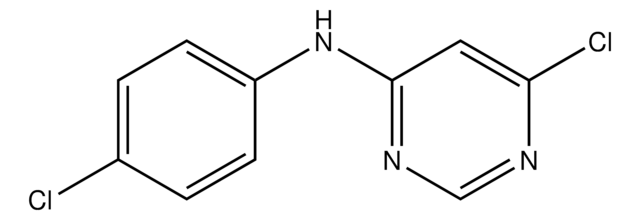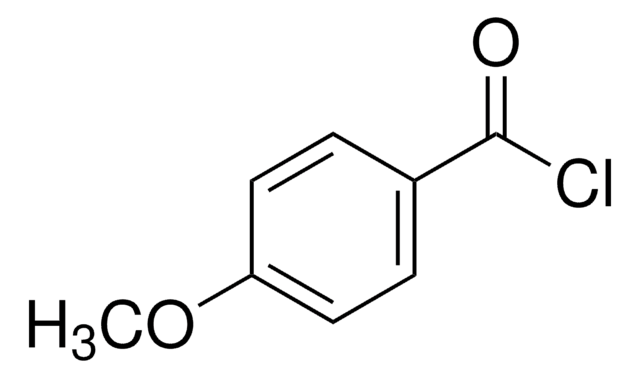B12695
Benzoyl chloride
ReagentPlus®, ≥99%
Synonym(s):
Benzoic acid chloride, alpha-chlorobenzaldehyde
About This Item
Recommended Products
vapor density
4.88 (vs air)
Quality Level
vapor pressure
1 mmHg ( 32 °C)
product line
ReagentPlus®
Assay
≥99%
form
liquid
autoignition temp.
1056 °F
expl. lim.
4.9 %
refractive index
n20/D 1.553 (lit.)
bp
198 °C (lit.)
mp
−1 °C (lit.)
density
1.211 g/mL at 25 °C (lit.)
functional group
acyl chloride
phenyl
SMILES string
ClC(=O)c1ccccc1
InChI
1S/C7H5ClO/c8-7(9)6-4-2-1-3-5-6/h1-5H
InChI key
PASDCCFISLVPSO-UHFFFAOYSA-N
Looking for similar products? Visit Product Comparison Guide
General description
Application
- 4-Methoxybenzophenone via acylation of anisole in the presence of cesium-substituted dodecatungstophosphoric acid (Cs2.5H0.5PW12O40) supported on K-10 clay.
- Benzoylamino acids via acylation of amino acids in the presence of diisopropylethylamine.
- p-, o-, m-Methylbenzophenones via benzoylation of toluene in the presence of Al-promoted sulfated zirconia catalysts.
Legal Information
Signal Word
Danger
Hazard Statements
Precautionary Statements
Hazard Classifications
Acute Tox. 3 Inhalation - Acute Tox. 4 Dermal - Acute Tox. 4 Oral - Eye Dam. 1 - Skin Corr. 1B - Skin Sens. 1
Storage Class Code
6.1C - Combustible acute toxic Cat.3 / toxic compounds or compounds which causing chronic effects
WGK
WGK 1
Flash Point(F)
161.6 °F - closed cup
Flash Point(C)
72 °C - closed cup
Personal Protective Equipment
Regulatory Listings
Regulatory Listings are mainly provided for chemical products. Only limited information can be provided here for non-chemical products. No entry means none of the components are listed. It is the user’s obligation to ensure the safe and legal use of the product.
PDSCL
Deleterious substance
PRTR
Class II Designated Chemical Substances
FSL
Group 4: Flammable liquids
Type 3 petroleums
Hazardous rank III
Water insoluble liquid
ISHL Indicated Name
Substances Subject to be Indicated Names
ISHL Notified Names
Substances Subject to be Notified Names
JAN Code
B12695-VAR:
B12695-BULK:
B12695-4X4L:
B12695-20L-P2:
B12695-5L:
B12695-25ML:4548173947495
B12695-2L:
B12695-2.5L:
B12695-1L-CB:
B12695-4L:4548173947501
B12695-1L:4548173947488
Choose from one of the most recent versions:
Already Own This Product?
Find documentation for the products that you have recently purchased in the Document Library.
Customers Also Viewed
Our team of scientists has experience in all areas of research including Life Science, Material Science, Chemical Synthesis, Chromatography, Analytical and many others.
Contact Technical Service











